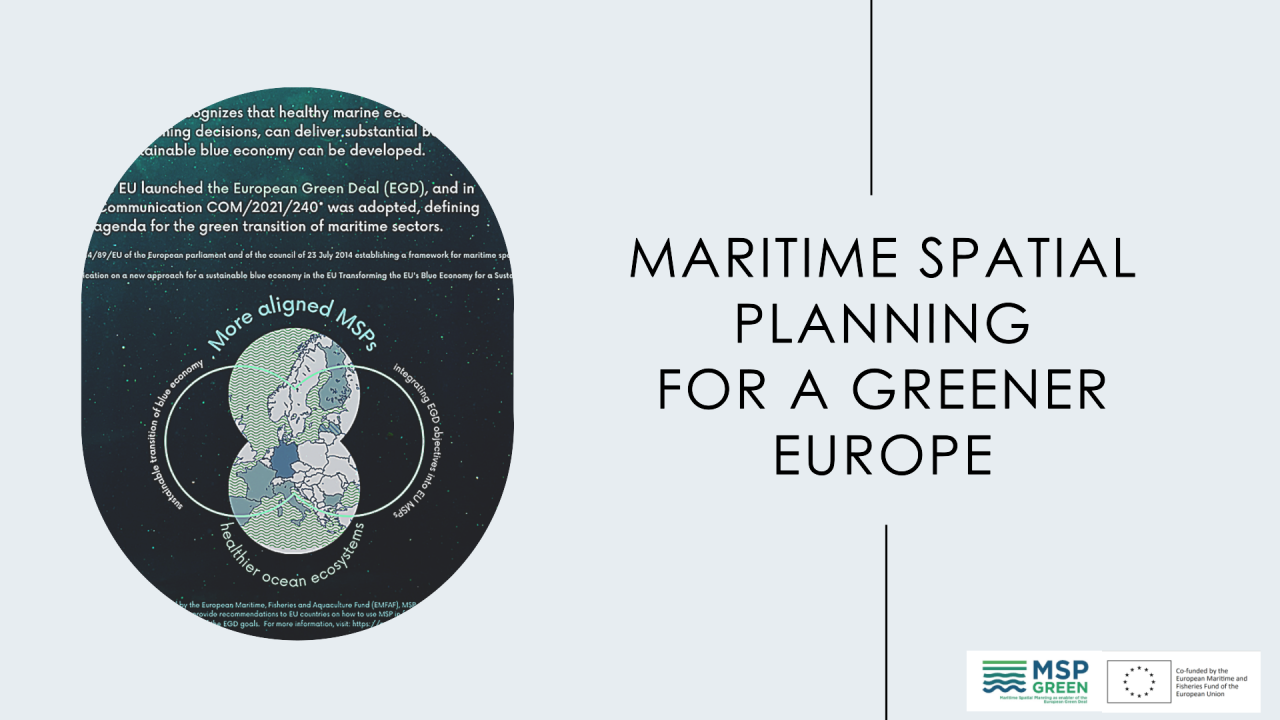
The EU Directive on MSP describes maritime spatial planning as: "a process by which the relevant Member State’s authorities analyse and organise human activities in marine areas to achieve ecological, economic and social objectives."
As such, the European Maritime, Fisheries and Aquaculture Fund (EMFAF) co-funded project MSP-GREEN contributes to align maritime spatial plans (furthermore - MSPs) to the ambition of the EGD. The project considers five European sea basins: the Mediterranean Sea, the Black Sea, the North Sea, the Baltic Sea and the Atlantic Ocean, within which the MSPs of Italy, Spain, France, Bulgaria, Germany, Latvia and Finland are analysed.
Over the past year - 2023, in the framework of MSP-GREEN project Working Package 2, a comprehensive methodological analysis took place where partners assessed whether and how their national Maritime Spatial Plans have considered the EGD objectives. This was realized by identifying which are the major gaps, the challenges encountered, and the trade-offs expected in mainstreaming EGD into MSPs. To achieve these objectives, partners analysed their national MSPs and identified the components in line with the various elements of the EGD actions: (1) climate change, (2) circular blue economy, (3) marine biodiversity, (4) marine renewable energy, (5) sustainable food provision, (6) zero pollution.
Additionally, the project addresses horizontal components of the EGD, such as achieving a just, fair and inclusive transition.
The multidimensional analysis (Deliverable 2.1) captures the diversity of the analysed plans, resulting from spatial and non-spatial planning approaches, as well as different planning contexts. It takes into consideration the organization of MSP governance from national to local level, the structuring of economic sectors and stakeholders, and the various statuses of planning tools (from strategic to prescriptive) used in MSP. More targeted nation-specific information are made available as Country Summaries.
To support this work, a workshop "Exchanging results from Working Package 2: Analysis of the Green Deal component of Maritime Spatial Plans" was organized at the Archipelago Sea (Finland) with its destination the Seili (Själö) island, providing an opportunity to contextualize findings with the on-site marine environment.
In conclusion, promoting the maritime EGD means promoting a theoretical approach based on scientific evidence, but that can only be achieved by a cultural transformation. This translates into defining evidence-based scenarios, performing necessary assessments, identifying existing valuable practices and providing meaningful narratives that can support difficult choices that society will have to take in the near future. By supporting the maritime dimension of the European Green Deal, the MSP-GREEN project is, therefore, taking part in shaping our reality by proposing new pathways across EU sea basins - a possible future, a future that thrives better conditions for current and next generations.
In the upcoming final year of the MSP-GREEN project, recommendations on how to strengthen the EGD ambition of EU MSPs will be prepared based on the results developed, including the consulting of experts and practitioners at EU level. This will be supported by the outcomes of thematic project partner workshops on sharing valuable MSP practices towards the EGD implementation across the various EU sea basins as to reach out towards new actions! Project results are to be transferred and further discussed across the EU sea basins, to strengthen the regional dimension and rise the ambition for a Sustainable Blue Economy, considering environmental, socio-economic, geopolitical and regional specificities.
For more information, visit: msp.green.eu.
Originally published by MSP-GREEN project!
